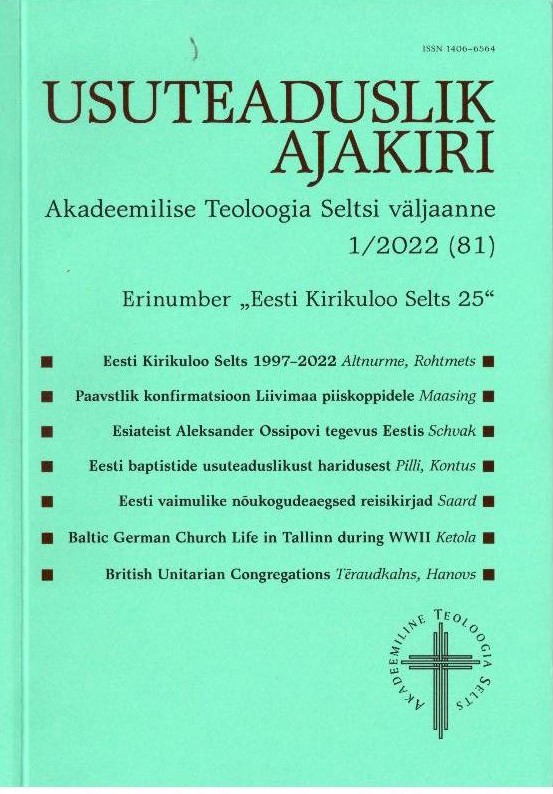Eesti baptistide usuteadusliku hariduse lugu 1922–1989
Story of Estonian Baptist Theological Education 1922–1989
Author(s): Toivo Pilli, Merlin KontusSubject(s): Christian Theology and Religion, Education, History of Church(es), Pastoral Theology
Published by: Akadeemiline Teoloogia Selts
Keywords: Estonian Baptists; formal and informal theological education; Estonian Baptist Preachers’ Seminary; Estonian Baptist Theological Seminary; informal friendship circles;
Summary/Abstract: The Estonian Baptist Preachers’ Seminary was established in 1922, with help from British and American Baptists. However, this significant moment in the story of Estonian Baptist education was preceded by the experiences of preachers who had studied abroad, in addition to local selfstudy interests and short Bible courses. The Seminary was renamed in 1932 and became the Estonian Baptist Theological Seminary. The article argues that theological education continued to be a part of Estonian Baptist identity that found its expression even throughout Communist times, when atheistic powers closed the seminary and it was impossible to offer formal theological education. Instead, Baptist leaders organised informal study groups in different regions of the country, encouraged reading, and offered the possibility to pass exams individually, based on literature they studied. They also found ways to send some students to study theology abroad during the Communist era. The article pays attention to correspondence courses, 1956–1960, that were organised by the Evangelical Christian and Baptist union leadership, after oral permission from the Commissioner of Religious Affairs. Even if this attempt proved to be short-lived, it helped to produce study materials that were used until the 1990s. Besides this, the article argues that informal friendship circles functioned as learning contexts. These circles were more flexible than study opportunities prepared by the union leadership, and their agenda was defined by the participants. The theological seminary of the 1920s and 1930s continued to bear fruit during Communist times, when a number of graduates faithfully served local churches, despite external pressures. Keeping theological education alive during these years paved the way for re-establishing the seminary in 1989.
Journal: Usuteaduslik Ajakiri
- Issue Year: 2022
- Issue No: 1 (81)
- Page Range: 98-126
- Page Count: 29
- Language: Estonian

